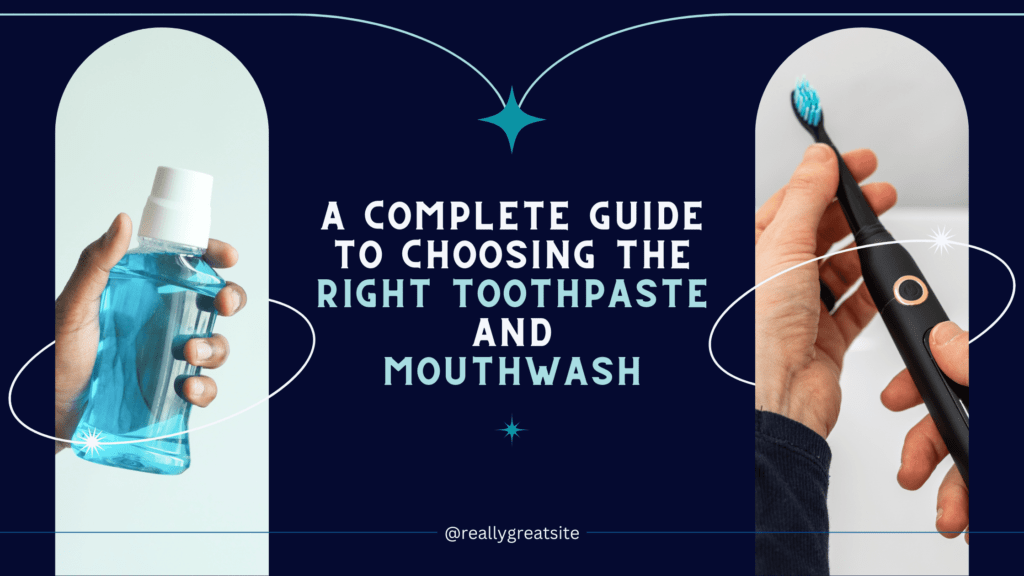Have you ever stood in the oral care aisle of a store, overwhelmed by the sheer variety of toothpaste and mouthwash options?
You’re not alone. Making the right choice can feel daunting, but it’s crucial for maintaining a healthy smile.
The health of our mouth is more than just about having a sparkling smile or avoiding bad breath. It’s a gateway to our overall well-being. That’s why choosing the right toothpaste and mouthwash is more important than you think. These products play a key role in keeping our teeth and gums healthy.
In this blog, we’ll explore the world of toothpaste and mouthwash. We’ll guide you through the available types, what to look for based on your specific oral health needs, and how to debunk common myths.
Understanding Oral Health
Before diving into the specifics of toothpaste and mouthwash, let’s understand why oral health matters. Good oral health means more than just avoiding cavities. It’s about keeping your entire mouth healthy – this includes your teeth, gums, and even your breath.
How do Toothpaste and Mouthwash Work?
Toothpaste and mouthwash do more than just clean; they’re essential tools in your fight against oral problems. Here’s how they help:
- Toothpaste: It’s your primary defense against tooth decay. Toothpaste contains ingredients that remove plaque – a sticky film of bacteria that forms on your teeth. If not removed, plaque can lead to tooth decay and gum disease. Certain toothpastes also have specific ingredients to tackle issues like tooth sensitivity and staining.
- Mouthwash: Think of mouthwash as the backup singer to toothpaste. It reaches places your toothbrush can’t, reducing the amount of harmful bacteria in your mouth. Mouthwash can also provide extra protection against gum disease and can help in maintaining fresh breath.
Common Oral Health Issues:
Using the right products can help prevent or treat common issues such as:
- Cavities and tooth decay
- Gum disease (like gingivitis)
- Bad breath (halitosis)
- Tooth Sensitivity
- Plaque and tartar buildup
The Science Behind Toothpaste
Toothpaste is much more than just a cleaning agent for your teeth. It’s a scientific blend of ingredients each serving a specific purpose:
- Fluoride: This is the superhero ingredient. Fluoride strengthens tooth enamel and helps remineralize areas damaged by acid, significantly reducing the risk of cavities.
- Abrasives: These help in physically removing plaque and food particles from teeth. Common abrasives include calcium carbonate and hydrated silica.
- Flavouring agents: These don’t contribute to cleaning but make the product taste better.
Different Types of Toothpaste:
- Whitening Toothpaste: Contains mild abrasives to remove surface stains.
- Toothpaste for Sensitive Teeth: Has compounds like potassium nitrate or strontium chloride to block the pathways that lead to sensitive tooth nerves.
- Tartar Control Toothpaste: Includes ingredients like pyrophosphates or zinc citrate to prevent the build-up of tartar.
Reading Toothpaste Labels:
When selecting a toothpaste, look for:
- Fluoride content.
- ADA (American Dental Association) approval seal.
- Specific ingredients tailored to your needs (like desensitizing agents for sensitivity).
How to Choose the Right Toothpaste?
Choosing the right toothpaste goes beyond flavor and brand. It’s about finding a product that caters to your specific oral health needs.
- Cavity Prevention: If you are prone to cavities, look for toothpaste with a high fluoride content. Fluoride is key in fighting tooth decay by strengthening tooth enamel and fighting bacteria that cause cavities.
- Gum Health: If you have issues with your gums, choose toothpaste that targets gum health. These typically contain antibacterial ingredients that help reduce plaque, a leading cause of gum disease.
- Tooth Sensitivity: Toothpaste formulated with potassium nitrate or strontium chloride can be effective for sensitive teeth. These ingredients help block the pathways that lead to sensitive nerve centers of the teeth.
- Whitening Toothpaste: If you’re concerned about the appearance of your teeth, whitening toothpaste might be a good choice. However, ensure it’s not too abrasive, as some can wear down enamel over time.
- Children’s Toothpaste: For kids, use an age-appropriate toothpaste. Young children should use toothpaste with less fluoride, and it should be used in pea-sized amounts to minimize swallowing.
- Special Needs: If you have specific dental conditions like dry mouth, look for toothpaste formulated to address these issues.
The Role of Mouthwash
Mouthwash complements your brushing and flossing routine. There are two main types:
- Cosmetic Mouthwash: Primarily aims to freshen breath and can provide a temporary solution to bad breath.
- Therapeutic Mouthwash: Contains active ingredients targeting oral health issues like reducing plaque, gingivitis, and tooth decay.
Key Ingredients in Mouthwash:
- Antibacterial Agents: Such as chlorhexidine and cetylpyridinium chloride, help control plaque and gingivitis.
- Fluoride: Aids in preventing tooth decay.
Using Mouthwash Effectively:
- Use as directed on the label or by your dentist.
- Don’t dilute the mouthwash with water.
- Use after brushing and flossing.
Selecting the Best Mouthwash
Just like toothpaste, the right mouthwash should match your oral health requirements.
- Alcohol Content: Mouthwashes come in alcohol-based and alcohol-free varieties. If you find alcohol mouthwashes to be drying or irritating, especially if you suffer from dry mouth, consider an alcohol-free alternative.
- Oral Conditions: If you have a history of dental issues like gum disease, choose a therapeutic mouthwash with ingredients like chlorhexidine or cetylpyridinium chloride for their antibacterial properties. For cavity prevention, a mouthwash with fluoride is a good choice.
- Combining with Oral Care Routine: Use mouthwash as a part of your comprehensive oral care routine. It’s best used after brushing and flossing to rinse away dislodged particles and deliver active ingredients throughout the mouth.
- Sensitive Mouths: If you have a sensitive mouth, avoid mouthwashes with harsh ingredients. Look for formulas specifically designed for sensitive teeth and gums.
- Cosmetic vs. Therapeutic: Decide if you need a mouthwash for cosmetic reasons, like fresh breath, or for therapeutic benefits, like reducing plaque and gingivitis. Some products offer both benefits.
Remember, mouthwash should not replace brushing and flossing but rather complement these practices. Always follow the product’s directions and consult with your dentist if you’re unsure about which mouthwash is best for you.
Myths and Facts
Myth 1: Whitening Toothpaste Can Replace Professional Whitening
Fact: While whitening toothpaste can help remove surface stains, they don’t possess the same strength as professional whitening treatments. If you’re looking for significant whitening results, it’s better to consult a dentist in Everett.
Myth 2: The More You Brush, The Healthier Your Teeth
Fact: Brushing too hard or too often can damage your enamel and gums. Stick to brushing twice a day with a soft-bristled toothbrush.
Myth 3: All Mouthwashes Are Essentially the Same
Fact: Mouthwashes vary significantly in their ingredients and purposes. Some offer cosmetic benefits like fresh breath, while others provide therapeutic benefits like reducing plaque or strengthening enamel.
Professional Advice
The guidance of dental professionals is crucial in making the best decisions for your oral health. Whether you’re scheduling a routine check-up or seeking urgent care from an emergency dentist in Everett, having a conversation with your dentist is key. Here are some talking points for your next dental visit:
- Ask about the best type of toothpaste and mouthwash for your specific needs.
- Discuss any oral health concerns, like sensitivity or gum problems.
- Inquire about professional treatments that might benefit you.
Conclusion
To maintain optimal oral health, it’s important to choose the right toothpaste and mouthwash, debunk common myths, seek professional advice, and consider the impact of your choices on the environment. By applying the knowledge from this guide, you can make informed decisions that benefit both your oral health and the planet. Remember, a regular visit to your dentist in Everett or major cities is also a key part of maintaining good oral health.


